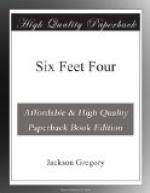There were many days in the life of Buck Thornton as in the lives of other cattle men hereabouts when he was absolutely alone with his horse, when he rode far out day and night upon some range errand, when, perhaps, he went two or three days together and saw no other man. Thornton remembered suddenly that when he had first heard of the murder of Bill Varney, the stage driver, he had just returned from such a lonely ride, a three days’ trip into the mountains to look for new pasture lands. If these men planned to commit these crimes and then to throw the burden upon him, he saw how simple a matter it would be for them to select some such occasion as this when he could not prove an alibi.
“They’ve come mighty close to getting me,” he muttered sternly. “Mighty damned uncomfortably close!”
He saw further. Winifred Waverly had said frankly that she had sworn to the sheriff that she knew it was Buck Thornton who had robbed her. They were managing to hold Cole Dalton off, and they had a reason. What? Perhaps to work their game as long as they dared, to make a last big haul, or to have their chain of evidence welded so strongly link by link that Thornton could not free himself from it and that no faintest breath of suspicion might reach them. Pollard would be in a position to prove that Thornton had paid him this five thousand only to take it back; it would give him a chance to break the contract, to regain possession of the Poison Hole and to keep the other ten thousand dollars already paid in as forfeited....
Why had they chosen him to bear the brunt of their manifold crimes? That, too, was clear to him. With him in the penitentiary or gone to the gallows the whole episode would be closed, the men who had put through the monumental scheme would be in a position to enjoy their boldly acquired profits with no fear of the law so much as searching for them. It was necessary to them that some man suffer for their wrong doing. Now: why Buck Thornton in particular? The reasons were forthcoming, logical and in order: he was a man whom Pollard hated; already Pollard regretted having sold the Poison Hole ranch for twenty thousand dollars; he wanted it back; Thornton happened to be a new man in the country and new men are always open to suspicion; he happened to be close enough to Ben Broderick in size and form and carriage to make the deception easy. And, thought Thornton, there was one other reason:
The undertaking of these men had already grown too big, the work too extensive, for it to be handled by two men alone. They had confederates; that was inevitable. Blackie, the saloon keeper in Dry Town, was one of them, he felt sure. The Bedloe boys, always ready for deeds of wildness and lawlessness, were others. The Bedloe boys hated him as keenly as did Pollard, and they were not the kind to miss an opportunity like this to “break even” with him. It was noteworthy that he had had no trouble with them since he had shot the Kid’s revolvers out of his hands at John Smith’s place last winter; they had left him entirely unmolested; the three of them who he knew were fearless and hard and vengeful, had not sought in any way to punish him. Here was the reason.




